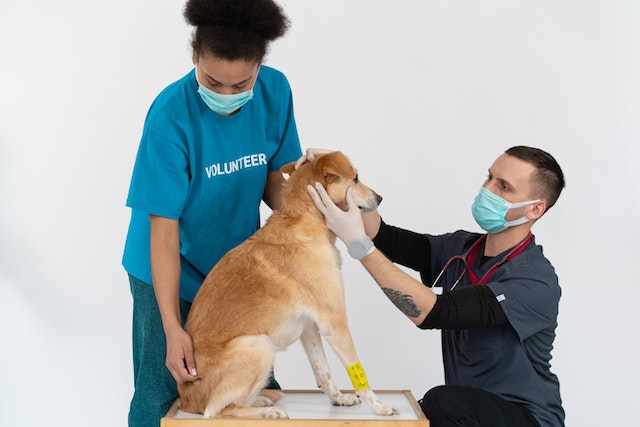10 Potential Causes of Deafness in Dogs Explained

Hey, there fellow dog parents! Today, let’s dive into a topic that might surprise you – the causes of deafness in dogs.
Whether you’ve noticed some hearing difficulties in your furry friend or you’re just curious about this fascinating subject, we’re here to explore the reasons behind deafness in our beloved canine companions.
Causes of Deafness in Dogs
Deafness in dogs can be caused by genetics, certain medications, infections, trauma to the ear, and age-related degeneration. It’s important to note that some dog breeds are more prone to deafness than others.
Let’s break it down further…
The following are some of the most common causes of deafness in dogs:
1. Genetics
Genetics can play a role in causing deafness in dogs. Certain dog breeds are more prone to inherit genetic mutations that can lead to hearing loss.
These mutations affect the development and function of the inner ear, specifically the hair cells responsible for detecting sound.
Prevention involves responsible breeding practices, such as avoiding mating dogs with a history of deafness or known genetic defects.
Treatment options for deaf dogs are limited, but some training techniques and communication methods, like sign language or vibration cues, can help deaf dogs navigate their environment and communicate with their owners effectively.
Additionally, advancements in genetic testing can assist breeders in identifying carriers of deafness-related genetic mutations, allowing them to make informed breeding decisions and reduce the incidence of deafness in future generations.
2. Age-Related Hearing Loss
Age-related hearing loss, also known as presbycusis, is a common cause of deafness in dogs. It occurs gradually as dogs age, affecting their ability to hear high-frequency sounds.
This condition is caused by the degeneration of the sensory cells in the inner ear, particularly in the cochlea.
Unfortunately, there is no known prevention for age-related hearing loss in dogs.
However, there are certain management strategies that can help improve their quality of life, such as providing a quiet and safe environment, using hand signals for communication, and considering hearing aids or cochlear implants as potential treatment options.
3. Ear Infections
Ear infections in dogs can be a cause of deafness. When a dog has an ear infection, the inflammation and buildup of debris in the ear canal can lead to damage to the delicate structures involved in hearing, such as the eardrum and the tiny hair cells in the inner ear.
Prevention of ear infections in dogs involves regular cleaning of the ears, especially in breeds prone to ear infections, and avoiding moisture in the ears.
Treatment of ear infections typically includes cleaning the ear canal and administering appropriate medication, such as antibiotics or antifungal drugs, as prescribed by a veterinarian.
In severe cases, surgery may be necessary to address underlying issues and restore hearing.
4. Side Effects of Medications
Side effects of certain medications in dogs can potentially lead to deafness. This occurs when the medications have ototoxic properties, meaning they can damage the structures of the inner ear responsible for hearing.
Prevention involves careful consideration and research when administering medications to dogs, especially those known to have ototoxic effects.
If deafness is suspected or observed, immediate veterinary attention is crucial.
Treatment options may vary depending on the severity and underlying cause of the deafness, ranging from discontinuing the medication to additional medications or therapies to manage or alleviate the condition.
Consulting a veterinarian is essential for accurate diagnosis and appropriate treatment.
5. Ear Trauma
Ear trauma in dogs can be a significant cause of deafness. It can occur due to various reasons, such as head trauma, loud noises, infection, or foreign objects entering the ear canal.
The trauma can damage the delicate structures in the ear, including the eardrum, middle ear bones, or cochlea, leading to hearing loss.
Preventing ear trauma involves avoiding situations that could cause injury, such as keeping dogs away from loud noises or hazardous environments.
Treatment for ear trauma-induced deafness varies depending on the severity of the injury but may include medication, surgery, or hearing aids.
Consulting a veterinarian is crucial for an accurate diagnosis and appropriate treatment plan.
6. Ear Tumors
Ear tumors in dogs can be a potential cause of deafness. These tumors can originate from various structures within the ear, such as the outer, middle, or inner ear.
The presence of a tumor can obstruct or damage the structures responsible for hearing, leading to hearing loss.
Prevention of ear tumors is challenging, but regular veterinary check-ups and ear cleanings can help identify any abnormalities early on.
Treatment options depend on the type and location of the tumor and may include surgical removal, radiation therapy, or chemotherapy. Early detection and prompt intervention are crucial for the best possible outcome.
7. Chronic Ear Inflammation
Chronic ear inflammation in dogs can contribute to deafness due to the damage it causes to the structures responsible for hearing.
The inflammation can lead to thickening of the ear canal, narrowing it and impeding sound transmission.
Prevention involves regular cleaning and inspection of the ears, as well as addressing any underlying conditions like allergies or infections.
Treatment for chronic ear inflammation includes medication to reduce inflammation and manage infections, as well as ear cleaning to remove debris. In severe cases, surgery may be necessary to alleviate the inflammation and restore hearing function.
8. Head Injuries
Head injuries in dogs can sometimes lead to deafness. These injuries can occur due to trauma, such as being hit by a car or suffering a severe fall.
The force from the impact can damage the delicate structures of the inner ear responsible for hearing, resulting in partial or complete deafness.
Prevention involves ensuring a safe environment for dogs, such as keeping them on a leash or in a securely fenced area.
Treatment options for deafness caused by head injuries are limited, and they often focus on managing the dog’s quality of life through training and communication techniques, such as using hand signals or vibrating collars.
Consulting with a veterinarian is crucial to determine the best course of action for each individual case.
9. Ear Canal Blockage by Foreign Objects
Ear canal blockage by foreign objects in dogs can contribute to deafness.
This occurs when foreign objects, such as dirt, grass, or small toys, become lodged in the ear canal, obstructing the passage of sound waves.
Prevention involves keeping the dog’s environment clean and free of potential objects that can enter the ears.
Treatment typically involves the removal of the foreign object by a veterinarian using specialized tools.
In severe cases, surgery may be necessary. Regular ear cleaning and examination by a veterinarian can help identify and prevent ear canal blockage in dogs.
10. Congenital Deafness
Congenital deafness in dogs refers to hearing loss that is present at birth or develops shortly after. It is most commonly seen in certain dog breeds with a genetic predisposition, such as Dalmatians and Australian Shepherds.
This condition occurs due to the absence or malformation of the structures responsible for transmitting sound in the inner ear.
Prevention is challenging since it is primarily a genetic condition, but responsible breeding practices and genetic testing can help reduce the risk.
Unfortunately, there is no cure for congenital deafness in dogs, but various management techniques, such as training with visual cues, can help affected dogs lead fulfilling lives.
Read more about how to identify a deaf dog.
Frequently Asked Questions
Can deafness in dogs be hereditary?
Yes, deafness in dogs can be hereditary. Certain breeds, such as Dalmatians, Australian Shepherds, and Boxers, have a higher risk of being born deaf due to specific genetic mutations. Breeding dogs with a history of deafness increases the likelihood of passing on this trait to their offspring.
Are there any medications that can cause deafness in dogs?
Yes, certain medications can potentially cause hearing loss in dogs. Aminoglycoside antibiotics, such as gentamicin and neomycin, are known to have ototoxic effects, meaning they can damage the delicate structures of the inner ear and result in hearing loss. It’s crucial to consult with a veterinarian before administering any medications to your dog.
Can ear infections lead to deafness in dogs?
Yes, untreated or chronic ear infections can lead to hearing loss in dogs. These infections can cause inflammation and damage to the structures of the ear, including the eardrum and the cochlea. Regular ear cleaning and prompt treatment of any ear infections are essential to prevent complications, including deafness.
Read more about ear mites in dogs.
Can trauma to the ear cause deafness in dogs?
Yes, trauma to the ear, such as severe head injuries or exposure to loud noises, can result in deafness in dogs. The force from such trauma can damage the delicate structures of the ear, leading to hearing loss. It’s important to keep your dog away from loud noises and provide a safe environment to prevent such accidents.
Is deafness in dogs always permanent?
Deafness in dogs can be either permanent or temporary, depending on the underlying cause. Some cases of deafness can be treated, especially if they are caused by infections or certain medications. However, certain genetic conditions or age-related degeneration may lead to permanent hearing loss. It’s crucial to consult with a veterinarian to determine the cause and potential treatment options for your dog’s specific case of deafness.
Read more about ear problems in dogs.
Conclusion
In conclusion, understanding the causes of deafness in dogs is crucial for pet owners to provide the best care.
Remember, genetics, age, infections, and trauma can all play a role in hearing loss.
By staying informed and proactive, we can ensure our furry friends live happy and healthy lives.
So, let’s keep listening and advocating for our beloved four-legged companions!



![Head Trauma in Dogs [Signs, Causes & Treatment] Head Trauma in Dogs](https://petcreeks.com/wp-content/uploads/2023/12/pexels-mikhail-nilov-7469230.jpg)


![Deafness in Dogs [Causes, Signs & Living With a Deaf Dog] Deafness in Dogs](https://petcreeks.com/wp-content/uploads/2023/09/pexels-mikhail-nilov-7469222.jpg)